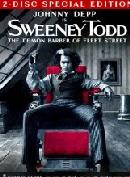HOME PAGE
SITE GUIDE
SEARCH
ADVERTISING AT CURTAINUP
REVIEWS
FEATURES
NEWS
Etcetera and
Short Term Listings
LISTINGS
Broadway
Off-Broadway
NYC Restaurants
BOOKS and CDs
OTHER PLACES
Berkshires
London
California
New Jersey
Philadelphia
Elsewhere
QUOTES
TKTS
PLAYWRIGHTS' ALBUMS
LETTERS TO EDITOR
FILM
LINKS
MISCELLANEOUS
Free Updates
Masthead
Writing for Us
A CurtainUp Los Angeles Review
Some Kind of Love Story
| The reason you're sick is 'cause you lie. — Tom to Angie
|
Now, for the first time on the West Coast, The Hayworth Theatre is presenting Some Kind of Love Story, starring Beege Barkette and Jack Kehler and directed by Michael Arabian. It seems to be something of a departure for Miller: a convoluted murder mystery set in a suburb of Boston in 1962.
Jack Kehler plays Tom O'Toole, an Irish private investigator and ex-cop, who has been chasing a murder case for nearly five years. The man convicted of the crime, Felix Epstein, is, Tom believes, innocent, and he has been hired by the Epstein family to prove it.
For the past five years he has been pursuing Angela (Beege Barkette), who apparently knows more about the murder than she is willing to tell. The fact that Tom and Angela had had an affair earlier may have loosened her conscience, but it hasn't loosened her tongue. ("If I told you what I know, when would I ever see you again?" she asks plaintively). Now she has called Tom to her apartment late at night under the pretext of telling him more about the murder. In actuality, she is just lonely, frightened, and horny.
Dressed in a sexy black negligee she begins her attempt to seduce him almost as soon as he walks through the door. Though sorely tempted, he resists her advances. He knows from long experience that if he gives her what she wants, she will not give him what he wants: namely, what she knows about the murder. ("You've still got a lot of priest in you"she taunts).
And so they begin their game of cat and mouse, with her teasing him with inconclusive pieces of information and him angrily threatening to leave. These ploys go on for quite a while and are annoyingly repetitive. To heighten the action a little, Miller wrote Angie as a crucible of multiple personalities. Thus she suddenly morphs into a foul-mouthed prostitute, Leontyne; then a thumb-sucking child; and, finally, a scornful, aristocrat with a British accent. It's an acting coup for the very talented Ms. Barkette, but it doesn't do much to advance the story line, which in the end, turns out to be all about crooked cops and drug conspiracies and who framed who and why.
Tom is what you might term an Irish schlemiel. He keeps falling for her acts and as she y dribbles out the secrets of the murder, he (and the audience) are left with multiple questions: is she really schizophrenic? Is she delusional? Is she fantasizing? Are all the many characters that she introduces as part of the murder story really involved in the activities that she says they are?
As is well known, many of Miller's plays are about Miller, his life and convictions. So, even though he wrote this play in 1982, he set it in 1962, the year after he ended his five-year marriage to Marilyn Monroe. It is hard not to read Marilyn into the beautiful blonde hooker of Some Kind of Love Story. And the put-upon, frustrated detective could easily be Miller's version of himself in that tortured relationship.
John Iacovelli has put the two protagonists into a lush bedroom, bouncing around on a huge bed with lavish silken sheets, and Traci McWain has designed appropriate costumes for both of them. But if you're still wondering if Marilyn is the intended role model for the tragic Angela, her final costume has to give you pause. After receiving a phone call from an admirer, she agrees to meet him at a local hotel. A few minutes later, when she returns to the bedroom dressed for her date, she is wearing a replica of Marilyn's famous white dress from Seven Year Itch.
|
Some Kind of Love Story By Arthur Miller Directed by Michael Arabian Cast: Beege Barkette (Angela); Jack Kehler (Tom).. Set Design: John Iacovelli Lighting Design: Frank McKown Costume Design: Traci McWain Sound Design: Bob Blackburn Running Time: 110 minutes without intermission The Hayworth Theatre, The Hayworth Theater, 2509 Wilshire Blvd., Los Angeles, (323) 960-4442www.thehayworth.com From : 08/09/08 to 08/31/08; opening 08/10/08 Tickets: $20 Reviewed by Cynthia Citron based on 08/09/08 performance |
|
REVIEW FEEDBACK Highlight one of the responses below
Paste the highlighted text into the subject line: Feel free to add detailed comments in the body of the email and state if you'd like your comments published in our letters section. |







